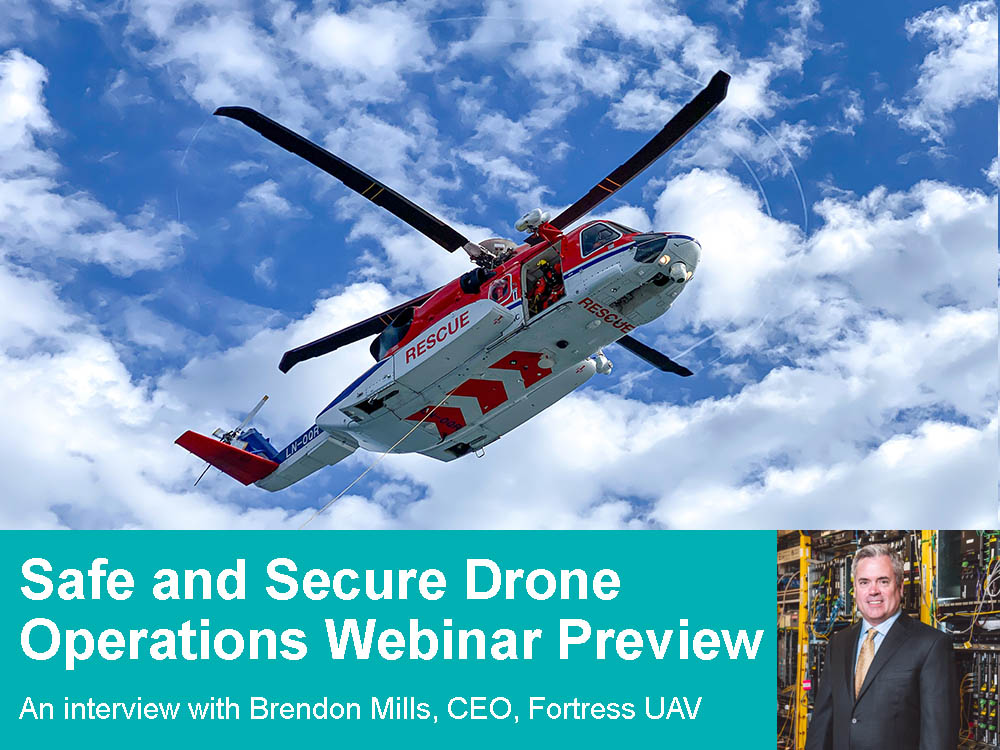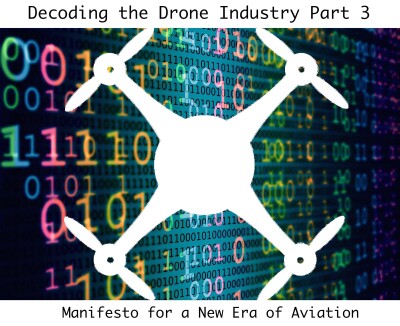While the differences that drones can make when it comes to completing tasks faster, cheaper and safer are well documented, what it means to actually see those distinctions realized can vary a great deal. Insourcing versus outsourcing questions around enterprise drone programs remain as pervasive as ever, especially since the costs and logistics associated with either can vary depending on the industry and applications.
Regardless of the approach, being able to perform safe and secure drone operations is the baseline that so many enterprise organizations are striving for, which is why that very topic is set to be discussed in detail during an upcoming Commercial UAV News webinar. Experts from across the space will discuss why security and safety matter, what you can do to build a safe drone operation, how to best document your operations and much more.
In preparation for that discussion, we connected with Brendon Mills, CEO of Fortress UAV. His company offers drone program logistics, field services, tech support, repair services and more, making him the perfect person to outline what it means to reliably, securely, and consistently fly safe drone missions. He’ll share further insights during the live webinar but we talked with him to preemptively explore the history of Fortress UAV, how his company has seen the drone market evolve and what it means to address drone challenges at scale.
Click here to sign up for the webinar.
Jeremiah Karpowicz: You founded Fortress UAV for the expressed purpose of providing UAS deployment, repair and logistics services to the drone market. How and when did you recognize the need in the market for this type of solution?
Brendon Mills: The parent company of Fortress UAV has been around since 2002, which was when an effort to create specialized telecommunications and electronics equipment began. In 2017 we recognized the drone industry was really taking off, and we recognized there might be a need for aftermarket services that could leverage the expertise and projects we had spent nearly two decades developing. As the technology has matured, these telecommunication and maintenance needs became that much more evident.
Ultimately, a drone is a piece of hardware. It’s a sophisticated piece of hardware, but it’s also one that both flies and can crash. The understanding allowed us to recognize a need for maintenance programs in this market, with services related to replacement, spare parts and preventive maintenance.
How have you seen this need in the drone market evolve over the past few years?
The needs have become much more focused on commercial applications. When we first entered the business it was still very consumer-oriented. Drone photography was quite popular while commercial acceptance and deployment hadn't really begun in earnest yet.
Since then, we've seen a real shift with the market not being dominated by early adopters but instead by enterprise stakeholders that are treating drone deployment as a reality. The majority of our business today is 95% commercial manufacturing, manufacturer and enterprise-oriented.
What can you say about how that shift has refined or defined the approach that enterprise stakeholders are taking to creating a drone program?
Once those commercial users got past the early fascination and just dabbling with the technology they quickly realized how and where drones could actually support day-to-day business activities. At that point, the need to manage a fleet becomes something that needs to be considered.
It’s not just the management of the assets that need to be considered though. While the drones themselves can range up to $10,000 apiece, the payloads sometimes are two to three times that amount. So you've got a single drone that might represent an investment of anywhere from $20,000-$50,000 as part of a fleet that could eventually number in the hundreds. Even on the low end of that, you’re talking about something that needs to be treated like a commercial asset.
That understanding has absolutely impacted the approach certain companies are taking to adoption.
And what has all of that meant for Fortress UAV in terms of the approach you’re able to take to provide enterprise stakeholders with the support they need for their drone program?
It’s defined how we want those enterprise users to think of us as an outsourced flight department.
For many commercial endeavors, drones are just one more consideration for established departments to integrate but we treat these assets in a much different way, which allows us to operationalize the technology. We’re working through RFPs from fortune 500 companies that are trying to operationalize their drone fleet on account of how we can handle dispatching services and sort through transportation issues. That goes from big to small, as we’re dealing with logistics like how batteries need to be charged at specific times with available spares at specific, known locations.
There’s a lot that goes into outsourcing your flight department, but the benefits can be seen and calculated.
That really makes it sound like you’re addressing and solving the challenges that arise at scale, because it’s one thing to quantify the difference the technology can make on a single project, but quantifying the value at scale is a much different endeavor.
Absolutely. We’re here to support the operationalization of the technology at the corporate level at scale. And we can do that for the drone market on account of our history and continued achievement with this kind of support.
We’ve been operationalizing equipment in the telecommunications market specifically for telco carriers now for 20 years. Being able to deliver the product into the field, support the product, maintain service level agreements on availability, provide a full spectrum of logistics for maintenance and support has resonated on multiple levels. We’ve established a cost effective approach that meets the stringent requirements for the telecommunications carriers and there's really no difference in terms of how we’re providing that same kind of dedicated and specific support for drone fleets.
What we’re offering is a high availability service that outsources how enterprise organizations can take advantage of drone technology. Because we've already been doing this on the telco side, we've expected the drone market to get here because it's going to be successful. What’s been really nice is that we've we have some validation of our hypothesis with all of that.
For us, the differentiator is that we're not resourcing pilots and we're not reselling the drone. We're not selling or deploying drone software. Our focus is about supplying a service related to drone technology that we know is not only needed but also based on the kinds of needs that have been met in other markets.
Does that make the service you’re providing especially unique or different from some of the other options for drone program support that might be available to enterprise stakeholders?
What we’ve found is that no one offers the complete end-to-end service solution like we do. You may encounter a reseller that does one of these pieces, but what they really want is to resell a certain drone. They don't really think about the long-term issues like preventive maintenance or the dispatching aspect of that piece of hardware.
We’re proving solutions for the operationalization of a drone fleet in the enterprise sector and there's not a lot of companies in this space that do that. Certainly not in the complete manner that we do. Additionally, we could do this domestically and internationally, because we do the same thing for telecommunications carriers themselves. So we have a very broad reach, and being able to maintain this type of service is kind of unprecedented.
If there’s one thing you want our audience to know about how Fortress UAV can help them reliably, securely, and consistently fly safe drone missions, what would it be?
The service we offer can really be thought of as an outsourced flight department. We can purchase the fleet on your behalf, we can provide a preventive maintenance program during the life of the asset and we can dispatch the asset on-site to specific service level agreements. We can also maintain the asset over time, which might see the sale or decommissioning of the asset at the end of that process.
We can do that as a commercially owned product, or we can do it as an operational recap. Our services are focused on operationally operationalizing a drone fleet for commercial applications in numerous industries, which is a unique value proposition that is not really being offered in a comparable way across the space.
Click here to sign up for the webinar.















Comments